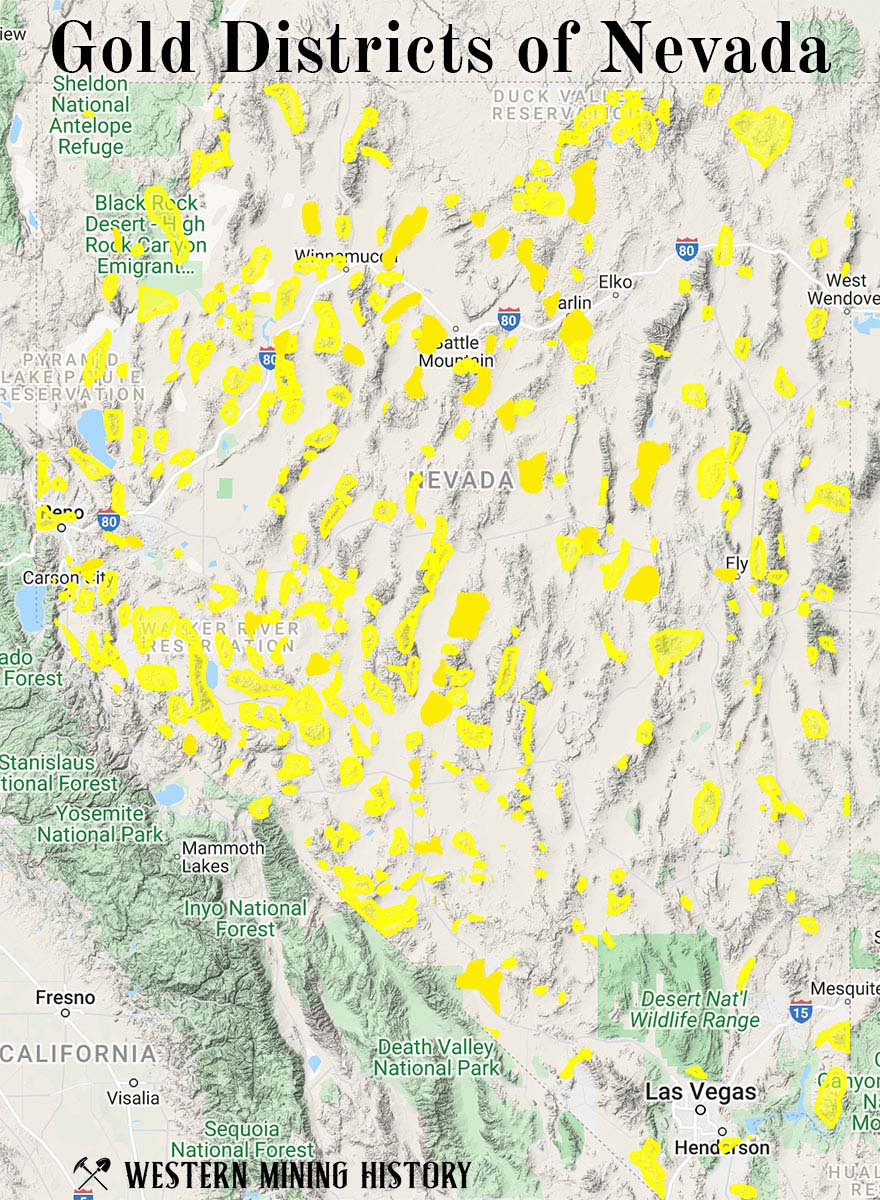The Lee Smith Mine is a gold mine located in Elko county, Nevada.
About the MRDS Data:
All mine locations were obtained from the USGS Mineral Resources Data System. The locations and other information in this database have not been verified for accuracy. It should be assumed that all mines are on private property.
Mine Info
Lee Smith Mine MRDS details
Site Name
Primary: Lee Smith Mine
Secondary: Smith Mine
Secondary: Smith West
Secondary: Mahala
Commodity
Primary: Gold
Location
State: Nevada
County: Elko
District: Jerritt Canyon District
Land Status
Land ownership: Private
Note: the land ownership field only identifies whether the area the mine is in is generally on public lands like Forest Service or BLM land, or if it is in an area that is generally private property. It does not definitively identify property status, nor does it indicate claim status or whether an area is open to prospecting. Always respect private property.
Holdings
Not available
Workings
Not available
Ownership
Owner Name: Queenstake Resources
Info Year: 2006
Production
Not available
Deposit
Record Type: Site
Operation Category: Producer
Deposit Type: Sediment-hosted Au; Carlin-type
Operation Type: Surface-Underground
Years of Production:
Organization:
Significant: Y
Deposit Size: L
Physiography
Not available
Mineral Deposit Model
Model Name: Sediment-hosted Au
Orebody
Form: irregular to lenticular
Structure
Not available
Alterations
Not available
Rocks
Name: Sedimentary Rock
Role: Host
Description: marine
Age Type: Host Rock
Age Young: Paleozoic
Analytical Data
Not available
Materials
Ore: Gold
Comments
Comment (Economic Factors): 2004: Smith West and Mahala combined: Proven reserve: 237,281 t, 0.278 opt Au (66,048 oz Au), Probable resv. 211,220 t, 0.36 opt Au (76,075 oz Au); Smith East and East Dash combined probable reserve: 200,799 t 0.301 opt Au (60,426 oz Au) The Jerritt Canyon/Mahala Project resource in 2006 was 420,600 tons grading 0.296 ounces of gold per ton measured+indicated (124,498 contained ounces of gold).
Comment (Identification): The Smith Mine is an underground mine developed on a deep orebody below earlier open-pit mined Jerritt Canyon deposits in the California Mountain-Dash mine area.
Comment (Workings): open pit
Comment (Commodity): Ore Materials: gold
Comment (Deposit): Jerritt Canyon deposits are Carlin-type replacement gold occurrences hosted by calcareous Paleozoic marine sediments. Tectonic and volcanic activity has led to complex faulting and folding which have created favourable sites for gold mineralization.
Comment (Development): 2004-active underground mining was under way. In 2006, Queenstake Resources Ltd. announced that recent drill results at the Jerritt Canyon/Mahala Project include 50-70 ft @ 0.652 opt Au (C40531); 50-80 ft @ 0.908 opt Au (C40538); 60-100 ft @ 0.528 opt Au (C40545); 60-100 ft @ 1.821 opt Au (C40551); 350-365 ft @ 0.328 opt Au (LX656)and 360-375 ft @ 0.615 opt Au (LX658).
References
Reference (Deposit): Long, K.R., DeYoung, J.H., Jr., and Ludington, S.D., 1998, Database of significant deposits of gold, silver, copper, lead, and zinc in the United States; Part A, Database description and analysis; part B, Digital database: U.S. Geological Survey Open-File Report 98-206, 33 p., one 3.5 inch diskette.
Nevada Gold

Nevada has a total of 368 distinct gold districts. Of the of those, just 36 are major producers with production and/or reserves of over 1,000,000 ounces, 49 have production and/or reserves of over 100,000 ounces, with the rest having less than 100,000 ounces. Read more: Gold Districts of Nevada.